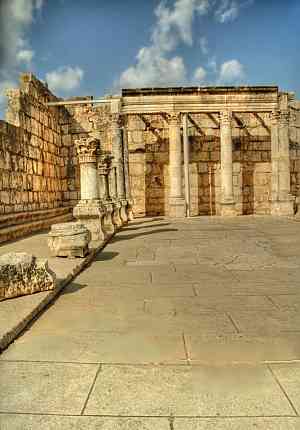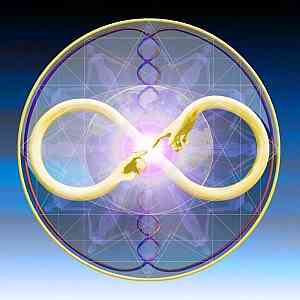
|
|
...the synagogue in Capernaum today |
by haRold Smith
a citizen of the Commonwealth
(Ephesians 2:12)
"Then Yeshua said to them, 'Most assuredly, I say to you, unless you eat the flesh of the Son of Man and drink His blood, you have no Life in you. Whoever eats My flesh and drinks My blood has eternal life, and I will raise him up at the last day. For My flesh is food indeed, and My blood is drink indeed. He who eats My flesh and drinks My blood abides in Me, and I in him. As the living Father sent Me, and I live because of the Father, so he who feeds on Me will live because of Me. This is the bread which came down from heaven - not as your fathers ate the manna, and are dead. He who eats this bread will live forever.'
These things He said in the synagogue as He taught in Capernaum. Therefore many of His disciples, when they heard this, said, 'This is a hard saying; who can understand it?' When Yeshua knew in Himself that His disciples complained about this, He said to them, 'Does this offend you? What then if you should see the Son of Man ascend where He was before? It is the Spirit who gives life; the flesh profits nothing. The words that I speak to you are spirit, and they are Life. But there are some of you who do not believe.' For Yeshua knew from the beginning who they were who did not believe, and who would betray Him. And He said, 'Therefore I have said to you that no one can come to Me unless it has been granted to him by My Father.' From that time many of His disciples went back and walked with Him no more. Then Yeshua said to the twelve, 'Do you also want to go away?'" (John 6:53-67)
Walking among the quiet solitude of these ancient stones in what is left of the Synagogue at Capernaum in Israel, it is hard not to reflect on Yeshua's words spoken in this very place that caused many of His disciples to "walk with Him no more." He had said words similar to these many times earlier in attempting to bring an understanding of the Kingdom to them - so, what was it about these words that were so different to create such a defining response in these who followed Him? What did He mean to "eat of His flesh and drink of His blood" - what did He really mean? Are these just "spiritualized" phrasings that have no basis in the real world? Or, perhaps, were they given as a literal explanation of what has to occur so as to embrace Life? Yeshua said if we fail to do these two things, we have NO LIFE IN US. He went further to say we have no ETERNAL LIFE in us - hum-m-m. That sure puts a kink into a lot of those religious pajamas we tend to wiggle up into. These words were spoken before the Last Passover, so maybe there is more to eating His flesh and drinking His Blood than a traditional religious ritual we suppose to be communion (see the previous article, Communion for an explanation. click on highlighted words to see content) - or a formulaic utterance we think guarantees our right of entry into Spirit. Maybe there was something tangible in what He was saying that caused many of those who had been following him for some time to suddenly realize the content of their meaning, enough for them to withdraw and not to want to have anything to do with Him anymore - to not believe. Could that happen to us? "Oh, NO! - not ME!!," you say - but, yet, scripture says many who had been following Him for some time "walked with Him no more." It just became too difficult for them not to be offended at His Words. (see what it means To Believe).
Consider, for a moment, that what was being lived out in front of the disciples was a Life so radical, so dynamic, so pervasive in touching the core of who they were as to defy everything they had come to understand and believe concerning their interpretation of reality and everything religious. What so crazed the purveyors of religion of the day, watching how this Person lived, was how far removed He was from any theological stance taken by most "believers in God". What was it occurring among those early followers of Yeshua that caused them to forsake everything, in a moment, by the thousands, to embrace this Life? It had to be more than a theological debate on the rightness or wrongness of it. The dynamic events described in the book of Acts are a far cry from what most in the "Christian" religion experience on a personal level in their lives today. In both the Greek and the Hebrew, the definition of "salvation" means "to be made whole, to be healed" (explained fully in the article, Salvation and Eternal Life). This wasn't just an exercise of the mind or a repetitious rendering of some phrases. Those early believers not only understood that salvation was a radical departure from everything they had been taught, they lived in it - it was why they gave up everything to obtain it. They could visibly "see" it manifest before their eyes, in their bodies and those they touched.
What does 2Corinthians 5:17 mean when it says to become a "new creation"? Reading carefully what Paul was saying in Galatians 3:26-29, he wasn't saying we "replace" one or the other. What we "become" is something entirely new, melded together from two distinct entities but carrying in that new entity the same properties of each of the single entities and, therefore, unrecognizable or "new" by human standards. Because of that "melding" in Him, we become "as" He Is, taking on His Nature and Characteristics (see Who Is Israel?).
 In Ephesians 5:31-32,
Paul says that he is speaking a mystery when he refers to the marriage relationship because he is actually speaking of the relationship between Yeshua, the Messiah of Israel, and His Body - those who have embraced His example of Life and, by so doing, become actual members of His Body; of His Flesh and of His Bone
Ephesians 5:28-30.
So, what does scripture say about the marriage relationship? In this very passage Paul cites the earliest writings when he quotes that "the two shall become ONE FLESH"
(Genesis 2:24).
Now, THIS is a mystery! Here you have, in the natural, two distinct, separate, individual entities and, yet, YHVH says they are not two at all - but ONE. Not just one spirit, of which they also become, but in this world - ONE FLESH, even though what you see with your eyes seems to be otherwise. Paul reiterates this phenomenon in
1Corinthians 6:15-17
when he says that "he who joins himself to a harlot is ONE BODY" and that we are members of the Body of the Messiah of Israel - ONE FLESH. In
Ephesians 5:30,
when he says we are "members of His Body, of His flesh and of His bones" - maybe, just maybe, that is what he means? Why do we approach scripture from one standard in one verse but assume an entirely different standard for another?
(see More on Marriage and Divorce for further insight).
In Ephesians 5:31-32,
Paul says that he is speaking a mystery when he refers to the marriage relationship because he is actually speaking of the relationship between Yeshua, the Messiah of Israel, and His Body - those who have embraced His example of Life and, by so doing, become actual members of His Body; of His Flesh and of His Bone
Ephesians 5:28-30.
So, what does scripture say about the marriage relationship? In this very passage Paul cites the earliest writings when he quotes that "the two shall become ONE FLESH"
(Genesis 2:24).
Now, THIS is a mystery! Here you have, in the natural, two distinct, separate, individual entities and, yet, YHVH says they are not two at all - but ONE. Not just one spirit, of which they also become, but in this world - ONE FLESH, even though what you see with your eyes seems to be otherwise. Paul reiterates this phenomenon in
1Corinthians 6:15-17
when he says that "he who joins himself to a harlot is ONE BODY" and that we are members of the Body of the Messiah of Israel - ONE FLESH. In
Ephesians 5:30,
when he says we are "members of His Body, of His flesh and of His bones" - maybe, just maybe, that is what he means? Why do we approach scripture from one standard in one verse but assume an entirely different standard for another?
(see More on Marriage and Divorce for further insight).
Could it be, just perhaps, that as Yeshua was "fathered" by Spirit, when we embrace His Life as our own, we also are "fathered" by that same Spirit to entertain a life as vital in the flesh as His was - and is? There is only two places in scripture where Spirit "breathed" upon men. The first time is in Genesis 2:7 where YHVH breathed into Adam - and, in so doing, imparted Life. The second time is in John 20:19-22 where Yeshua breathed ruach hakodesh (the spirit of holiness) into the disciples - again, imparting Life and a precursor to the outpouring of Spirit to all who would receive Him in Acts 2:1-4. From a reading of both Leviticus 17:11 and Acts 15:20, we can observe that these Hebrews understood that the Life is in the Blood. What does it mean to be "born anew" in light of Ephesians 5:30? Could it be that the DNA He inherited from His Father and coursed through His Blood might actually, in reality, course through our veins as well as we embrace His Life - He being the first among many brethren to experience the Spirit of the Father in the flesh? (Romans 8:29). Could it be that the cleansing His Blood affords us from the moment we are made "new creatures" is because His Blood literally begins to flow in and through us - that this mixture of "spirit" and "flesh" is not a mixture at all, but one? Could Romans 8:11 have a literal meaning - for us as well as for others? Is to forgive meant to keep our blood pure and when we forgive sin we are actually imparting the virtue of the Blood we inherit from the Father by means of the flesh into this earthly realm? As Yeshua showed us by His own Life when He said, which is easier to say, "be healed" or "your sins are forgiven?" (Matthew 9:5).
Could it be that we fail to understand the eternal ramifications of this short life we live in the flesh? It is a mystery how it could happen, something above what our human intellect can perceive, but the more I read scripture, the more I come to see that the core of who we are actually, physically changes the more we embrace Who He Is. Much on the same order as two distinct people, who remain married for 50 years, begin to take on the same physical characteristics - they begin to "look" alike. How many times have you seen that? Even though it is a mystery, this phenomenon is still evident all around us. Why is it that nowhere in scripture is it recorded that Yeshua ever healed the disciples or delivered them from demons as He had others? Perhaps, it is because He empowered them with the same Power He had received from the Father as they embraced the Life He was living? After all, in Luke chapters 9 and 10 He sent them out the same way He had been showing them how to live. In fact, Yeshua said the same Glory He had received of the Father, He has given to all who would embrace His Life. (John 17:20-23, see what it means to live in In Perpetuity with Spirit). What Glory was He speaking of?
When Moses asked to see YHVH's "glory" (Exodus 33:18), what ultimately passed before him were the actual, realized Nature and Characteristics of YHVH - they were visible, they could be "seen". One Hebrew meaning of the word "glory" is literally translated "liver" (see the Power In His Name for a full explanation). The liver is the organ that cleanses the blood of our physical bodies and the only organ that has the ability to reproduce itself. Notice that in the passage of John 1:12-13, it is only those who receive YHVH by believing in His Name that are given the power to become a 'son of YHVH'.
 Only to those Who believe, that is, only those who are faithful through adherance to His Name. Whose Name is that verse speaking of? The Name of YHVH found in
Exodus 34:1-7
and that passage begins with the giving of the Ten Words which constitute the Nature of the Name of YHVH found in
Exodus 34:5-7.
The embrace of the Words of YHVH that contain the characteristics of His Name produces the Blood of Righteousness that cleanses and keeps His Blood pure within those who receive His Words. This is why He said in
Luke 22:17-19
to take the cup "and divide it among yourselves" - Drink My Blood
Only to those Who believe, that is, only those who are faithful through adherance to His Name. Whose Name is that verse speaking of? The Name of YHVH found in
Exodus 34:1-7
and that passage begins with the giving of the Ten Words which constitute the Nature of the Name of YHVH found in
Exodus 34:5-7.
The embrace of the Words of YHVH that contain the characteristics of His Name produces the Blood of Righteousness that cleanses and keeps His Blood pure within those who receive His Words. This is why He said in
Luke 22:17-19
to take the cup "and divide it among yourselves" - Drink My Blood
Yeshua said in John 6 above that His flesh was food, the bread of Spirit - which is why His Words are Spirit and Life because the Words He speaks are not His but the Words of His Father, YHVH (John 14:23-24) and is why His Words make those who embrace them "clean" (John 15:3). As the "Bread of Life", those who eat of His Flesh abides in Him and He in them. What happened to the last food you ate? After chewing on it until it was in a manageable form to swallow, your internal functions take over - digesting it until it became a part of you. It fed the system that houses the blood. The same thing that happens with the food we eat also happens with what we see, what we hear, what we think and the actions we take upon them - they are internalized and become a part of us. According to Yeshua, as we partake of His flesh, the example of Life He led in the flesh - that same phenomena also happens within His Body. He said also in Luke 22:17-19 that the bread was His Body and as often as we partake of, have fellowship with, be in communion with His Body, to do so remembering the Way He does it with us. That is what the Greek word, koinonia (translated "communion" in English) means - fellowship, intercourse, intimacy. This is the same Greek word used by Paul in 1Corinthians 10:16-17 - "I speak as to wise men; judge what I say. The cup of blessing which we bless, is it not the communion (koinonia - fellowship, intercourse) of the blood of Yeshua? The bread which we break, is it not the communion (koinonia - fellowship, intercourse) of the body of Yeshua? For we being many are one bread, and one body: for we are all partakers of that one bread." To have koinonia fellowship with YHVH's chosen is what it means to become a citizen of the Kingdom; what it means to have the King of the Kingdom abiding within (Luke 17:20-21) - Eat My Flesh.
So, how did Yeshua demonstrate, example The Life, the Glory He has given to us? He manifested the Name of the Father (John 17:6) and praying in John 17:20-21 that we ALL become ONE WITH HIM JUST AS HE WAS ONE WITH THE FATHER - flesh of His flesh and bone of His bone. That, by the way the world saw His Body function, they might know that He was sent by His Father (see Just As - Even So for a complete explanation). To become a member of Yeshua's Body, then (which is different from His Bride), means we are to BECOME, IN THIS WORLD, AS HE IS (1John 4:17). Now, consider these words from 2Corinthians 6:14-18 in the light of Yeshua's words as Sha'ul (the apostle Paul) quotes Leviticus 26:12, Jeremiah 32:38, Isaiah 52:11, and Exodus 4:22:
|
"Do not be unequally yoked with unbelievers. For what partnership has righteousness with lawlessness? Or what
fellowship (koinonia - communion, intercourse)
has light with darkness? What accord has haMashiach with Belial? Or what portion does a believer share with an unbeliever? What agreement has the temple of Elohim with idols? For
WE
are the temple of the living Elohim; as YHVH said:
'I will make my dwelling among them and walk among them, and I will be their Elohim and they shall be my people. Therefore go out from their midst, and be separate from them, says YHVH, and touch no unclean thing; THEN I will welcome you, and I will be a father to you, and you shall be sons and daughters to me, says YaHoVeH Tzva'ot'." |
Most associate this passage as a comment on physical marriage or simply ignore it altogether. While certainly applicable to a marriage covenant - words mean things. When read closely, we find Sha'ul's understanding of what it means to be "unequally yoked" exceeds the dimension of just two individuals because he is not speaking of INDIVIDUAL temples - but, of a SINGLE, COLLECTIVE temple that can be totally contaminated by the entrance of a single embrace of unbelief - an embrace of someone who does not regard the Words of YHVH manifested in Yeshua as Truth. They are unclean because they do not adhere to ALL the Words of Yeshua whose Words are those of the Father's found in Exodus 20:1-17 that makes one clean. To be a member of the Body of Yeshua, a citizen of the Kingdom of YHVH, to abide in YHVH's temple, means those members have a collective responsibility to keep it clean by adhering to the Words of YHVH. The Life Yeshua led and entreated us to follow was not some esoteric, ethereal affair only realized after death - it was a down-to-earth, in this earth reality that, once attained, we carry with us (as He did) and our Purpose then becomes to bring that Life into this earthly realm (2Thessalonians 1:9-12, Luke 17:20-21). The Life of the Flesh is in His Blood (Leviticus 17:14, John 6:53-54) and the virtue, the glory of His Life lived by the Flesh cleanses His Blood - it keeps it pure. As we embrace and appropriate the Virtue of His Words as our own, that Blood found in Him literally begins coursing through our veins and makes us clean (John 15:3). This is not a mystical experience. It can not be said enough - Romans 8:11 is a literal happening. Now, consider the words of Yochanan (John) as he echos what Sha'ul says in 2John 1:9-11:
| "Anyone who goes too far and does not abide in the teaching of the Messiah, does not have YHVH; the one who abides in the teaching, he has both the Father and the Son. If anyone comes to you and does not bring this teaching, do not receive him into your house, and do not give him a greeting; for the one who gives him a greeting participates (koinonia) in his evil deeds ." 2John 1:9-11 |
Yep - you are reading it right. A variation of the same Greek word we have been looking at, koinoneo, meaning communion or fellowship is found in this verse from 2John and, with it, he gets downright unsociable - telling us to not even say "hello" to those who do not hold to "this teaching". What teaching is he referring to? How about verse 6 - "...this is love, that we walk according to His commandments: this is the commandment, just as you have heard from the beginning, so that you should walk in it ". What teaching "from the beginning" is so important that John tells us to practice unsociable behavior? Does John mean from the beginning of Yeshua's arrival, or does he mean "In the beginning was the Word" written previouly in John 1:1 which plainy says, "...the Word was YHVH"? Can you have "in the beginning was the Word" and not have what Moses delivered? (see the actual reading of who the original Greek says is the Word).
All of Yeshua's life entailed His obedience to His Father's Words (isn't that what the parables are about? - see how each of the Beatitudes can be referenced from the Original Writings). - and doesn't that imply our commitment to the same teaching? After all, He did say to "follow Me" (Luke 9:23). Here is where we need to take a breath and remember that ALL of the Hebrew Yeshua's teaching was directed toward a Hebrew audience, a Hebrew family of the Hebrew Elohim. So, as with Marriage, trying to overlay Hebrew principles onto a religion that does not acknowledge the teaching of the commandments is like trying to make pigs appear as apples. If someone comes to you and says, "Oh, I believe in Jesus", but then he goes on to tell you that "Jesus didn't keep kashrut (dietary instructions)" or "Jesus taught that we aren't under the Law anymore and it doesn't apply to us" - it becomes clear that person is not part of the same family as you. Should you treat that person as if they were in fellowship with YHVH and in agreement with you? (Amos 3:3, see the difference between the Hebrew Yeshua and the Christian "Jesus"). Would your social etiquette outweigh your commitment to what you know is Truth? And - is this all we have to worry about? John now uses the same underlying verb (koinonia) to warn us of another kind of participation. By saying nothing about the disregard for Truth, we come into fellowship, communion (koinonei) with the deception of the one who is deceived.

|
|
...becoming one |
Part One: Marriage...
Part Two: ...Divorce...
Part Three: ...Remarriage?
Part Four: Communion
Part Five: Flesh and Blood
|
"If anyone does not obey our word through this letter, take special note of that person
not to associate with him, so that he will be put to shame." 2Thessalonians 3:14 |
Please feel free to email them to me at harold@hethathasanear.com. While not claiming to have all the answers, it would be an honor to share with you what the Spirit is uncovering.